On his last day on the job, John Ottway sits in a bar full of workers. Most are involved in a violent brawl, but he sits alone isolated and unbothered by his surroundings. His sad eyes seem lost in thoughts of hopelessness. As he walks out in the cold mist to a remote spot, we learn of a suicide letter he’s written to the wife who left him. Ottway holds the barrel of a rifle in his mouth and closes his eyes, ready to pull the trigger. The unlikeliest of signs makes him remove the rifle, the howl of a wolf in the dark.
Joe Carnahan’s “The Grey” tells the ironic story of a suicidal man who ends up fighting for his life after a plane crashes into the wolf-infested wilderness of Alaska. I don’t know about you, but the first half of that sentence interests me more than the second half.
No family, no friends, nothing waiting for him, just the memory of a brighter past. Why would a man who got stripped down till he had nothing left, a man seriously contemplating suicide, end up fighting for his own survival? The question left me thinking of this philosophically heavy film all year. People walked into the movie expecting a plane crash and Liam Neeson fist fighting wolves and got a much deeper art film.
I’ve read countless reviews of people criticizing the film’s harsh depiction of wolves and how the behavior of wolves is portrayed unrealistically, but if that’s what they think the film is about, then sadly they only see the surface.
“Jaws” isn’t about realistic shark behavior. Its sole purpose isn’t to portray great white sharks as man-eaters; it’s about characters overcoming their inner demons. Chief Brody facing his fear of going to the water, Quint dealing with his past experience at the Indianapolis; “Jaws” is about characters facing their fears instead of running away from them. What distinguishes “The Grey” from all the “Jaws” copycats is that it isn’t about man vs. nature, but man vs. himself.
If you still haven’t seen this modern masterpiece, I suggest you stop reading at this point to avoid spoilers. Make no mistake; “The Grey” is not a slow film. It features very well constructed scenes of intense action and sheer horror. Take the plane crash for example.
It is without a doubt the most horrifying plane crash ever depicted on film. The camera pans back the dark corridor of the plane’s dim interior. We see the passenger TV flickering like there’s a loss of electricity. The passengers are silent and unnervingly asleep because of the turbulence. We see cold air exhaled from the passengers as we move all the way to our protagonist, who too is in deep sleep. A sudden drop and the disturbing sound of power failure interrupt his calm dream.
The director wisely avoids cutting to an exterior shot of the plane plunging into its demise. We’re kept in the plane, with the characters, and it’s as close as a director could get to have his audience strapped in seatbelts.
This scene is a testament to the power and importance of sound. Another impressive scene that makes good use of sound takes part much later in the film. After the plane crashes in the middle of nowhere they set out to the distant woods to avoid any more wolf attacks.
As soon as they arrive they make a quick fire to fend off the wolves chasing them. We don’t actually see the wolves, but Carnahan literally tell a story through sound. Using only growls and cries, we learn that one of the wolves tries to take on the alpha male but ultimately fails.
After repeated viewings, I noticed that there’s a lot more to this significant scene than meets the eye, or ear for that matter. The mirroring scene that follows shows tough guy Diaz (Frank Grillo) as he challenges the dominance of the alpha male of the human pack, Ottway.
Throughout the film the tension between Ottway and Diaz builds up to this critical moment. It all starts right after the plane crashes. When Ottway notices Diaz is stealing a calfskin wallet off one of the dead bodies, he confronts him. “I’m going to start beating the shit out of you in the next five seconds. And you’re going to swallow a lot of blood for a fucking billfold.”
With Liam Neeson’s badass delivery, Diaz wisely throws the wallet away. The next morning the verbal confrontations continue when Diaz disagrees with Ottway’s decision to leave the crash site, “Nobody nominated you shit by the way!” Frank Grillo delivers a magnificent supporting performance and seeing his character arc from beginning to end is bound to pull a few heartstrings.
The verbal duels eventually lead to a physical one which mirrors the unseen incidents happening within the wolf pack. Ottway ultimately tells him that it’s okay to be scared. Diaz takes it the wrong way and thinks he’s questioning his masculinity. One thing leads to another and the alpha wolf interrupts their brawl. The wolf takes a step forward, Diaz takes one back.
The film has a very interesting take on masculinity. Hollywood has always displayed men to be brave and fearless, and for some reason this has sunk itself into the human psyche. We now attribute real men with false characteristics. And here comes Ottway, who’s emotionally beaten up, and he’s standing up against this false image of masculinity.
Diaz: Cause I wanna live, motherfucker. Do you understand that? I don’t want some Timberwolf shittin’ me out on this mountain.
Ottway: You’re scared.
Diaz: What?
Ottway: You don’t need all that nonsense, all that chest puff bullshit. What’s wrong with being scared?
Diaz: I’m not scared.
Ottway: You’re not?
Diaz: No.
Ottway: I’m terrified.
Diaz: I can tell.
Ottway: And not an ounce of shame in saying it. I’m scared shitless.
Diaz: That’s because you’re a punk. I don’t walk through this world with fear in my heart.
Ottway: You pick that up in the pen? Somebody scribble that in the day room wall?
Diaz: You better take it easy, motherfucker.
Ottway: Talking tough means jackshit now. You’re not scared? You’re a fool. Worse, you’re a fucking liar.It’s a beautiful confrontation and the fact that it all mirrors the previous scene adds to the metaphorical depth of “The Grey”. We’re all just animals in this world; human ego has us believing otherwise. There are so many ways to look at the film, because it’s rich with symbols and philosophical undertones.
One of the more interesting takes on the film is that John Ottoway is a lone survivor and all other characters are just facets of his personality. Think about it, the macho tough guy, the family man, the non-believer, and the believer. This theory is supported by the fact that after the crash we see him all alone in the midst of everlasting snow. At the film’s finale, he’s alone once again.
I referred to Ottway as both a believer and a nonbeliever. The truth is, he’s both. I don’t know why people like to label one another based on religion. Faith isn’t as simple as black and white. There’s grey in between and many people place themselves there. When asked whether he’s an atheist he replies, “Nope…I’m a realist. I really wish I could believe in that stuff. This is real, the cold.” He lets out a breath. “That’s real, the air in my lungs, those bastards right there in the dark stalking us. This is the world that I’m worried about not the next.”
“The Grey” explores man’s most frightening questions, the reason we’re on this planet, if there’s an afterlife or if “dead is dead”. What makes this film so scary to me aren’t the wolves, but the fact that it encapsulates so much of what we fear as human beings, our fear of heights, flights, drowning or dying alone.
The number of survivor starts declining and surprisingly most characters die from the very things I mentioned. The most memorable death to me has to be that of Diaz. The one character we thought would never give up finally gives in accepting the fact that we all die one day.
“What I got waiting for me back there? I’m gonna sit on a drill all day. Get drunk all night. That’s my life. Turn around and look at that. I feel like that’s all for me. How do I beat that. When will it ever be better? I can’t explain it.”
At his final moments, he’s alone admiring the scenery. We only hear the faint sound of footsteps getting louder as the wolves come closer. Death is approaching. Diaz’ last words are “I’m not afraid”, and unlike the first time he says those words we actually believe him.
Eventually Ottway is left all alone. He looks up at the sky and calls for God. “Do something! Come on, prove it! Fuck faith, earn it! Show me something real. I need it now, not later, now! Show me and I’ll believe in you till the day I die. I swear. I’m calling on you. I’m calling on you!” Nothing happens. “Fuck it, I’ll do it myself.”I’m sure I’ll quote that last line for years to come, because it rings so true. All my life I was told to pray for things I wanted, to pass an exam, to get accepted into university, to stay healthy. “Just leave it to God.” has been said to me over and over again at times of great frustration. But I never believed the world worked that way. I had to study to pass the exam, improve my grades to get accepted into university and avoid various harmful food or drugs to stay healthy. I had to earn it. I believe God helps those who help themselves.
Anyway, we reach the much talked about ending. The most heartbreaking moment to me is as Ottway looks into the wallets of all his now deceased friends. He looks at family pictures and learns what each character was fighting for, family. When he flips open Diaz’ wallet, all he sees is a driver’s license and it’s utterly heart wrenching. Ottway wraps his hands on the wallet forming praying hands. He finally places it with the other wallets, all assembled to form a cross.
We learn that Ottway’s wife has died at the final moments of the film. Natasha Richardson, talented actress and wife to Liam Neeson unfortunately passed away due to an untimely skiing accident two years prior to filming. I can’t help but wonder if some of Neeson’s real emotions translated into the film’s core powerhouse performance.
Like faith movie interpretations aren’t as simple as black and white. I think “The Grey” could be interpreted both ways depending on how you look at it. One could argue that no miracle happened, he ends up surrounded by wolves, dies alone and that’s the end of it. But one could also argue that the appearance of the alpha wolf is exactly what he asked for, a sign from God. The wolves finally showing up might be seen as proof that there is a God who wants him reunited with his wife. After all, his suicide attempt was interrupted by a howl and maybe this is God’s gift to him, a way to die without having to actually kill himself.
So why was the suicidal man fighting for his life? To find the meaning to life? A reason to live? Maybe I asked the wrong question; maybe Ottway wasn’t fighting for his life but for his death, to earn it.


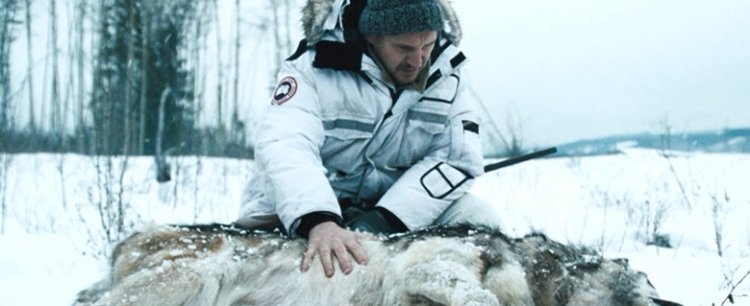
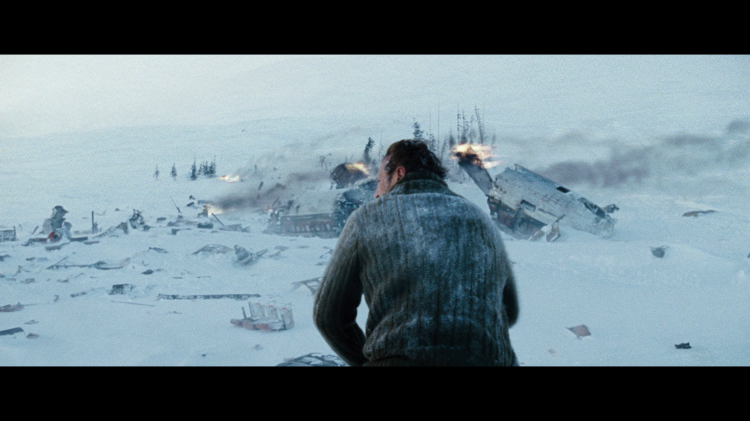
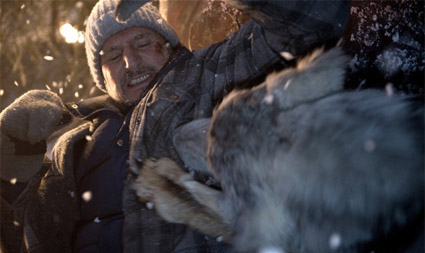
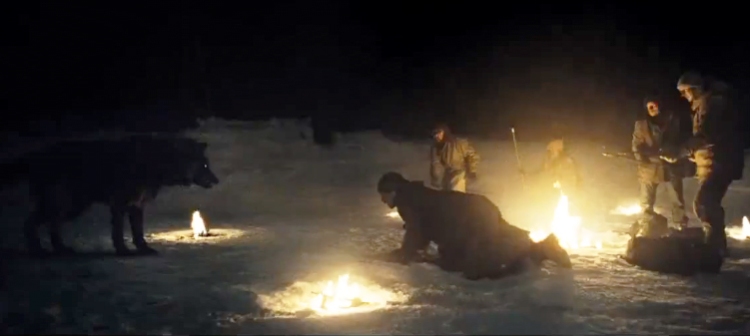
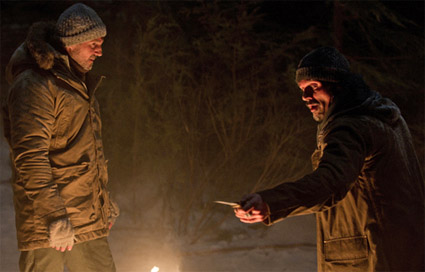
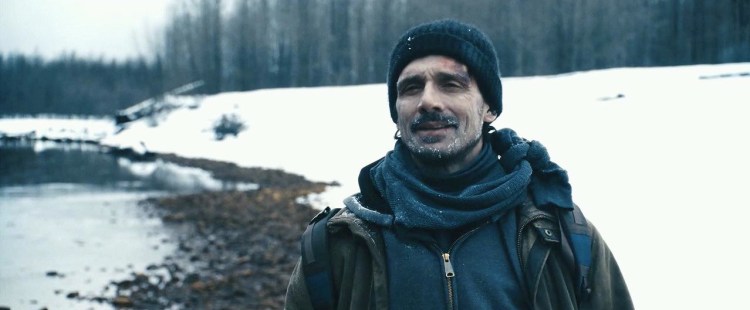
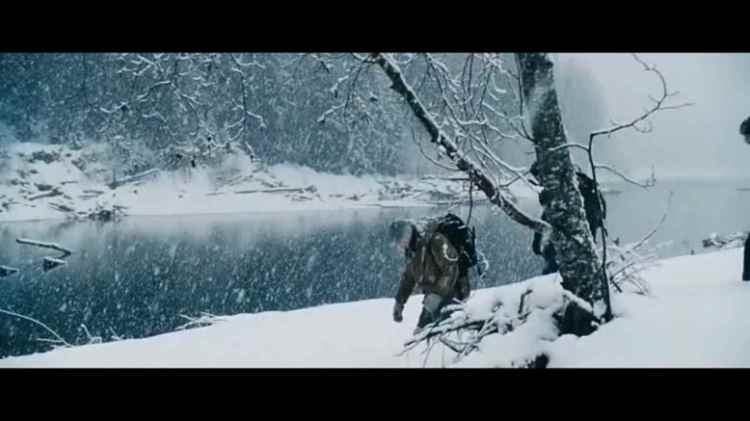
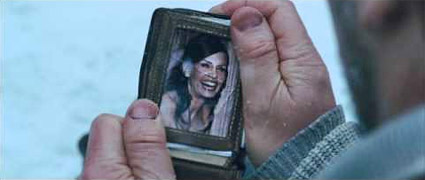
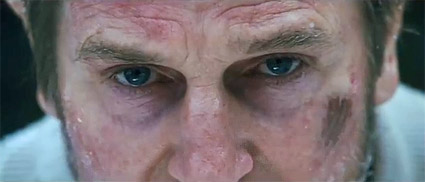
just watched it and was looking for some sort of analysis of it. Will add a couple of random thoughts:
– Ottway makes the wrong decisions several times, even as he keeps everyone alive. The main example is leading the group away from the plane to escape the wolves, and ultimately walking right into their den. It struck me as an odd suggestion in the movie — leave the crash site and go into the woods? In the real world, one would assume that the crash site is the best place to stay and wait for rescue. And aren’t the woods were wolves live (and are depicted as living and hunting in the movies?)
– Another wrong decision: He almost gets into a fight with Diaz about taking the wallets. Then the next day he has a sudden change of heart and suggest collecting them after all. Obviously he opposed it the first time because it seemed like an affront to the deceased, but the fact remains that Diaz made the “right” choice first. the GPS enabled wristwatch could also be included here — Diaz looks disrespectful when he takes it, but then he mentions the GPS functionality, and it is seen as the right decision. Indeed, before one know the ending, one gets the feeling that the quick decision to take that watch may be what saves them in the end.
– You suggested that walking into the wolves den might have been the sign from God. Another bit of evidence for this is the flash of the bright sun behind him right as he stops for the final time, unable to take another step. Not only is the sun a standard symbol for God, it’s one of the few times where the sun is visible in the entire movie (possibly the only time?). This scene precedes the one with the wallets.
– The scene at the end where he puts the wallets into the cross could also be interpreted as him finally putting his faith in God. A few scenes before he cursed God, asking for a sign or some sign of help but receiving nothing. Then we get him giving up his fight (stops walking), then the ray of light (actually almost the whole screen filled with the glare for a second or two), then he gets down on his knees (show of submission), then gets out the wallets and puts them carefully into a cross. This wasn’t obvious at all to me at first — I thought for a while that he was looking at the wallets to remind him that he had a “mission” to complete, or even to use them to start a file. Only something that popped up after re-watching and reading your and others’ analysis.
– One of the oddest parts of the movie is that I can’t remember a single character ever complaining about being cold or hungry. Cold and hunger are surely the two most likely killers for anyone stuck in this position, but no one mentions it at all. To be sure, they talk about preparing for cold and gathering food, but no one ever says “I’m really cold” or “I’m really hungry”. In a movie where you feel like you’re out in the brutal wilderness with them, it’s a startling omission. Almost every scene shows the cold — somehow it’s cold enough to see their breath inside the plane! Not to mention the weather is on hyper-drive — multiple snow and windstorms seem to pass through every day. But the only people killed from the cold are those already dying. I assume this is to direct one’s attention toward the battle between the wolves and the humans, but it went from mildly distracting during the middle of the movie to way over the top at the end, when Ottway is in a freezing river for a few minutes, then takes his time getting out, then just keeps on moving — no change of clothes, no shivering, no starting a fire.
– Related to the point on cold and hunger is how sleep and fatigue are handled. One or two people die in their sleep, but they’re already severely weakened — fair enough. But people seem to be able to sleep a lot, even on the first night, after they’ve just experienced a plane crash and are outside in the brutal cold and injured. (Oh, and there are wolves). I’d think that they would find it harder to sleep than to stay awake that first night.
– Also about the wallets: there seems to be a lot going on here. First Ottway wants to leave them (to respect the dead), the take them (to provide something for the family). So it’s a
– I liked the idea that all the characters were just different aspects of Ottway’s personality. The looking through the wallet scene at the end could be seen as Ottway having his entire life flash before his eyes as some claim happens right before death.
– There are some interesting connections between the beginning and end of the film. One is the crosses — the giant neon one as he walks into the bar, and then the cross made from wallets at the end. And although he’s surrounded by all those giant pipes and machines, he is at the heart of the most important substance keeping our modern world going: oil. In the final scene, he is in the center of the force of nature that has been trying to kill him all movie: the wolves’ den. But by the end, it feels somehow right that he is among the wolves. For one, the audience is starting to accept the fact that he’s probably not going to make it out of here — we’ve just been bludgeoned for two straight hours with the cold reality of death. Also, he knows so much about the wolves that it seems fitting that his death is at their hands (paws? teeth?), rather than by falling or freezing.
– Finally, there is a line in his opening narrative about these men being “unfit for mankind”. The movie can be seen as putting these men in their proper place: Most die in the crash. The survivors are slowly defeated by the wolves and other forces of nature. Most interestingly, Ottway ends up the wolves’ den. He has become a wolf, doing whatever it takes to survive in the wilderness. The final scene is essentially a challenge to the alpha from another wolf in the pack — that wolf is Ottway. The other wolves don’t instantly attack, but instead clear space for the alpha, just as they would for any fight inside the pack, presumably. The transformation is complete when he says the poem for the final time and the camera focuses in on his eyes. This is my favorite moment in the movie — his face is a swirl of emotions that suddenly hardens into the fearless, bloodthirsty stare of a wolf, and then we see a split second of him jumping forward to attack the wolf. Because wolves don’t sit back and wait for their attackers to come at them — THEY do the attacking. Hands down my favorite moment in the movie.
The final seconds after the credits fit into this idea as well. Based on the plot of the movie, one would expect this scene to show some evidence of who won the battle. Presumably both alphas have mortally wounded each other and are breathing their final breaths. But when I saw the scene, I saw a friendly scene. Neither wolf nor human have any visible injuries. No other wolves are around, The alpha’s breathing is an obvious indicator of life. And I was thrown off for a moment, I think , because it also resembles a man lying on his dog’s side — one of the most comfortable expression of the friendship between humans and dogs. It reminds one of the many dream sequences throughout the movie, where Ottway has been lying right next to his beloved wife. The intimacy suggests that, in a sense, Ottway has become one of the pack or that instead of killing the alpha he is simply become its owner (as a typical pet-owner relationship). And finally, one could think back to Ottway’s scene at the beginning in which he guides a dying man to death, and later when a dying character’s long-haired daughter appears, and say that the alpha is who has appeared to lead Ottway into death.
The more I think about it, the more connections appear. Few of them are too obvious — just very subtle. To me that’s a sign of a great movie!
LikeLike
I think you make some very valid point. I think the decision of going to the woods was a mistake but as far as he knew, it was a better place to protect himself. he seemed to have struggled with decision as it was definitely risky to leave the crash site.
As for the wallets. I think it differed in the intentions of taking the belongings. The wrist watch was a survival tool and was therefore ok to rip off. Diaz’s intentions to take the wallet was for its quality. In other words, his intentions were more that of a thief.However, Ottway took the wallets to have something to give back to the families of the lost ones if they survived, so his intentions were good hearted.
I like your analysis on that final look and how Ottway is some ways became part of the pack or was about to take that role. He certainly had to act like them in order to survive and wasn’t just running away from them but challenging them along the way. I think “The Grey” is one of the best if not the best film of the year and it’s a shame it got overlooked at the Oscars.
LikeLike
Thank you sire for the great analysis .. i was so upset after watching final scene,came here and now i can see lights 😀
another point that i might add if i’m not wrong (i hope i’m not) is that the protagonist at the end, when he was preparing for the fight, he wore the watch. i would read that as a sign of hope. like if he was so sure he would beat the big wolf and will need something to show him the way back home after the fight. means our friend is gonna make it back. some might think it’s narrow thinking but i really need to see it this way.
Thank you again for the great analysis.
LikeLike
Thank you sire for the great analysis .. i was so upset after watching final scene,came here and now i can see lights 😀
another point that i might add if i’m not wrong (i hope i’m not) is that the protagonist at the end, when he was preparing for the fight, he wore the watch. i would read that as a sign of hope. like if he was so sure he would beat the big wolf and will need something to show him the way back home after the fight. means our friend is gonna make it back. some might think it’s narrow thinking but i really need to see it this way.
Thank you again for the great analysis.
LikeLike
Reblogged this on Glory Fades.
LikeLike
At first I felt let down by the ending…The good guy always wins, right?!! The more I thought about it the more I saw a message about faith and suffering. There is a reason why we don’t find out about his wife ’till the end… We were meant to jump to the conclusion that she left him because he was a drunk deadbeat loser who was only capable of holding a job killing animals in the arctic. His wanting to commit suicide was a desire to end his pain and join her. His reluctance was based on his faith in God and the teaching that suicide will not put him on a bullet train to heaven (no pun intended). God gave him a sign… a way out… the wolf. After all his suffering, his wife dying, the plane crash, hunted by wolves, his companions dying off one by one, he still has not lost his belief in God. He asks God for a sign, he demands one! when he looks to the heaven, all is grey. There is no sign… there is no help coming, and he curses God. Even then, when he is outraged at his lot in life, when he is confronted, alone, with shear terror he does not loose his belief in God. When his time has come the light shines down on him, not as a sign for him, but as a sign for us that God IS watching over him and belief/faith in Him will be rewarded for all eternity even if we don’t win the lottery, even if our most beloved die of cancer, even if children are hacked to death in some African hellhole, even when your own child curses you and says they hate you… You don’t stop loving them a single bit.
I really don’t want to sound all preachy … Just what I got out of it….. Although it would have been pretty cool to see him kicking some wolf ass!!
LikeLike
I love your interpretation of the film. While I looked at it from an existential nihilistic lens (matching my own atheist beliefs), it’s also reasonable to consider that the protagonist is actually undergoing a spiritual journey. It’s a testament to how good the film is that both these perspectives can be valid.
The film refuses to give us an easy answer too, leaving it up to us to ponder. Truly exemplary stuff.
LikeLike
Ottway makes a huge blunder leaving the plane crash site. A real outdoor man would know that the first point of survival is shelter. The survivors of the crash had plenty of material at the crash site to build a shelter – strong enough too to keep out the wolves.
Walking off into the Alaskan wilderness in winter is asking for a death sentence especially as they had so little equipment and no map. The Oil Company would surely have briefed all personnel on procedure about what to do in the eventuality of a crash. This would certainly have told survivors to stay at the crash site so that rescuers could find them more easily. The company would know the track of the flight and the plane would almost certainly have had a black box with transponders emitting emergency signals. The crash site would have had some food and probably enough to keep the men alive until the rescuers arrived. What did they intend to eat in the forest in winter? Leaving his half broken rifle is another major blunder. Even with the stock snapped he could have fired it at close quarters.
The film story and message is dated and weak – it’s not too dissimilar from some cowboy films of the early 1960s – tough guys being picked off one at a time by the “enemy” with a token female driving the main character onwards – internal wrangling within the group.
Ottway would almost certainly have died the night after falling in the river. The scene with the tied ropes and jumping into the trees was pathetic eye candy for the pop corn brigade.
Did he die at the end? Well I hope so because Ottway led those other guys to their deaths on a totally insane idea that they could walk out of the Alaskan wilderness in winter with the kit they had. Not much of an outdoors man and not much of a story.
3 out of 10 ….sorry
LikeLike
You really need to work on you film criticism chops. Yeah, Ottway may have made a mistake leaving the crash site; protagonists are allowed to make mistakes. In fact, it is better that they do. Also, this is a movie, not Survivorman. It’s not a movie about how to survive a plane crash, its a movie that is essentially about nature demanding human sacrifice, to remind humans that no matter how adept they get at manipulating their environment, they are still subject to it’s harshness. The script dictated that these characters had to die and the author correctly figured that it’d would be more marketable for them to die in the wilderness to play up the man vs. nature angle rather have them all set around the wreckage for an hour on screen.
The film story also dates back way further than the 1960s and it bears no relationship to the Ford western films. Not thematically or visually. And there is no token female character? All the players in this story are men since one of the themes is the usefulness of traditional masculinity (i.e. Diaz in the film is a big tough guy and where does that get him). But I digress. Man vs. Nature narratives have been around since the very concept of narrative has existed. But in terms of what The Grey in particular is derivative of, I’d say it borrows heavily from the themes and elements of Jack London’s stories, many of which take place in a sub-arctic environment, involve canine characters, and share the core narrative theme of survival. Just because this is a old theme does not make it “dated” because most literary and cinematic themes are broad and are timeless. Man vs. Nature Narratives will never become irrelevant so long as both man and nature exists.
The only decent observation you made was when you made the comment that “Ottway led those other guys to their deaths”. You’re right there, but you draw the wrong conclusion from it. Ottway knows he is responsible for the deaths of his friends. That’s kind of the whole point of the wallet scene. He took on the responsibility of keeping them alive and failed. That’s what we call character development.
It is not enough to say that the story is weak; you actually have to demonstrate how. But there is a big difference between “film criticism” and “nitpicking”. It is easy to point out parts of the movie that aren’t realistic, but fiction has no such obligation to be realistic. As long as the narrative is told in an effective and sensible manner (i.e. with the absence of glaring plot holes or timely, convenient interventions) then unrealistic elements can be forgiven. So yeah, stop nitpicking and maybe spend some time studying other critics. The late, great Roger Ebert wrote a lot of reviews, if film criticism is something you’re interested in you could learn a ton from his methods.
LikeLiked by 1 person
I couldn’t have said it better myself. Thank you, Coleman.
LikeLike
I actually love this film I watched it a fair few times and still like to put it on now and again people have to realise it’s about him not the wolfs and why moan it was great seeing them battle against them the clip at the end after credits gets me every time it leaves you thinking is the wolf dying while he lays against the wolf and is outtway dead or dying or alive I don’t think we will ever know.
LikeLike
I felt this movie symbolized the struggle with depression the main character has. Mental illness plagues him, but he chooses to survive and fight.
LikeLike
I love this analysis of The Grey, as it has become one of my favorite films. I remember seeing the reviews after this came out and thinking it would be a good, though not great film. I watched it for the first time and was immediately taken in by its depth and boldness. I knew quickly that this wasn’t just a man vs. nature movie. I later watched it again, this time with my brother, and he loved it as much as I did (not too surprising seeing as how we have nearly identical movie taste). We discussed it for hours afterward and in the days that followed. I should also say that the second viewing for me was far greater than the first one, and that’s saying something, but at the same time it is not surprising as I have long believed that most movies shouldn’t be reviewed until after at least two viewings, because familiarity with a film offers better perspective. The Grey is outstanding, and a modern masterpiece in my opinion. I truly hope that in the years to come people will rediscover it and realize just how great it is, and just how much thought, feeling, and effort went into its making. I also think it has Liam Neeson’s best performance since Schindler’s List. People, if you’re out there and you haven’t seen this film, buy or rent it now!
LikeLike
This way by far the best thing I’ve read this year , googled this for some theme or explanation on the film and you expanded it to a great length I would never have thought of.
LikeLike
Thank you for your very kind words. I’m glad you find the piece useful.
LikeLike
To me, the film is about choosing to live in times when life seems pointless and full of pain. It isn’t a action/thriller film, it’s a psychological film, in the sense that it deals with emotions of life, death, loss and coming to terms with the inevitable. I personally think that this is a fantastic film that deals with issues that are rarely covered in so much depth
LikeLike
Wow. I’ve always believed The Grey to be a great film and have read many interpretations of it, but I have to say, your analysis is absolutely spot on. It made me consider points I hadn’t previously picked up and made me love the film even more for it. What a great analysis. Bravo.
LikeLike
that was an amazing analysis thank you
LikeLike